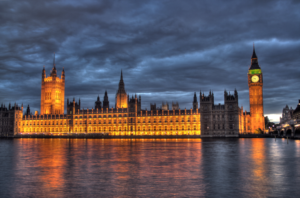What Do Weedkillers Have To Do With Brexit?
Here’s What You Need to Know
With only three weeks to go before the United Kingdom’s referendum on whether or not to remain in the European Union, the polls show a razor-thin race within the margin of error. Any issue could tip the scale one way or the other, which means the EU’s debate over reauthorizing glyphosate, the UK’s most widely used weedkiller, couldn’t come at a worse time for Team Remain.
In fact, if the UK votes to leave the EU on June 23rd, we may have a ban on a common weedkiller to thank for the move.
- Brexit Polling Divide: Those Who Benefit From EU Versus Those Frustrated By Its Regulations: Big business and voters in professional services want to remain in the EU because they see the benefits of being within the European common market. Small business owners and other locally-focused constituencies such as farmers, however, are more inclined to support an exit due to their frustration with what they perceive as regulatory overreach from Brussels.
- In Lead Up To Brexit Vote, Brussels Is Threatening Regulatory Overreach That Will Anger British Farmers: As the Brexit debate is raging, those farmers and small business owners looking to extricate themselves from the regulatory impediments of the Brusselcrats are now facing the possibility of the UK’s most widely used weedkiller – glyphosate – being banned by the European Commission.
- The EU’s Great Glyphosate Debate: As Politico has reported, “Glyphosate’s EU authorization expires on June 30, and the Commission proposed a 15-year renewal period earlier this year.” But, contradictory reports of the pesticide’s carcinogenic properties along with pressure from environmental NGOs and European governments led to a last-ditch compromise of a one- to two-year renewal to allow the European Chemical Agency to finish its safety study. However, part of Germany’s fragile coalition government remains firmly opposed to any renewal, leaving the rest of the EU at the mercy of internal German politics.
- Will The EU’s Move Drive Farmer Turnout? An April poll of UK farmers already found 58 percent of them supporting Brexit. The question is whether that number will rise with an EU glyphosate ban and if it encourages those who weren’t likely voters to go to the polls on June 23.
- Rural Revolt? While farmers alone are not likely to sway the vote, the 20 percent of the UK voters who live in rural areas are statistically much more likely to show up and vote on referendum day and could tip the scale in favor of the Leave campaign.
News You Can Use
PRODUCTIVITY AND POPULISM
U.S. productivity is set to fall for the first time in over three decades, according to research by the Conference Board whose chief economist says the solution is for companies to “invest seriously in innovation.” Unfortunately, American companies are pulling back on investments in the building blocks of business – such as machines, computers, and steel. With this pairing likely to lead to stagnant wages, look for the populist discontent that helped propel candidates like Bernie Sanders and Donald Trump to remain a mainstay in 2016 American thought.
Subscribe to Receive Insights
"*" indicates required fields
WHEN POLLS MATTER
With 159 days until the election, is it worth paying heed to polling? A recent New York Times analysis of polling for every presidential election going back to 1980 concluded that nationally averaged polls at this point in the campaign cycle have been off by more than eight points. Not until sixty days before the election do the polls begin to solidify within a reasonable margin of error (+/- 4 points). So while recent polling could have a positive impact for campaigns seeking momentum and money, they are not likely to tell us who will prevail in November.
TSCA FIGHTS TO COME
Sometimes compromises lead to more fights. Last week, Congressional Republicans and Democrats – along with the chemical industry and several environmental groups – rallied around a compromise bill updating the Toxic Substances Control Act for the first time in decades. It gives a significant amount of authority to the EPA to evaluate and restrict specific chemicals, but some in the environmental and consumer advocacy world are still dissatisfied. One environmental group told the Wall Street Journal that the compromise “removes too much authority from states” and the organization would continue its consumer campaigns “even after the law is passed,” both within EPA rulemaking processes and in statehouses across the country.
TAKING TO THE STATES
The national fight over internet privacy policy has moved to the state level in Illinois. Major tech firms are sparring with privacy advocates over Illinois’ Biometric Information Privacy Act, which, as written, is one of the toughest privacy laws in the country. The debate in Illinois marks a trend outlined by Pam Dixon of the World Privacy Forum, who says statehouses are increasingly becoming privacy battlegrounds. This attitude isn’t just applicable to privacy policy either, more and more policy areas traditionally considered federal issues are coming up in statehouses across the country.
LIKE YOUR LANDLORD… OR ELSE
Recently, a Salt Lake City apartment building circulated a “Facebook Addendum” to tenants, demanding they become Facebook “friends” with the building within five days or be in breach of their lease agreements. Several residents criticized the policy for violating their online privacy, but building owners claim their only intent was to create a private forum for residents to communicate over social media. The attempt to avoid embarrassment for the building has clearly failed, as their public Facebook page is now littered with complaints and criticism of the policy.
FEDERAL DEBT DENIAL
Following a series of budget deals between the White House and Congress over the past several years, many Americans – even policymakers and reporters who follow such things – think our federal debt level has gotten better. But in reality, Mercatus Center fellow Charles Blahous points out, “Not only are things a little worse than we recently thought they’d be, they’re a lot worse than we expected several years ago.” The latest CBO projection, for example, estimates federal debt held by the public now sits at roughly 75% of GDP, up from roughly 50% of GDP in 2009. Yet, “in January 2010 the baseline debt projection for FY2016 was 65.5% of GDP, substantially less than current levels.” If we don’t assert reality over perception, Balhous warns, the results “would be a highly damaging indulgence of cognitive bias.”
THE SECRET OBAMACARE MEETING
In January 2014, several IRS officials – who objected to the White House’s plan to use billions in taxpayer dollars to implement Obamacare’s crucial consumer healthcare subsidy despite a lack of clear statutory authority – were secretly ushered into a meeting with the Office of Management and Budget to view a memo outlining the administration’s justification. None of the attendees were allowed to take notes or make copies of the information presented to them. This bizarre meeting is a major revelation for House Republicans as they fight key provisions of Obamacare in federal court and proceed with investigations by the Ways and Means and Energy and Commerce committees.
Mark Your Calendars
Tuesday, June 7: California, Montana, New Jersey, New Mexico, and South Dakota primaries; North Dakota Democratic caucuses



